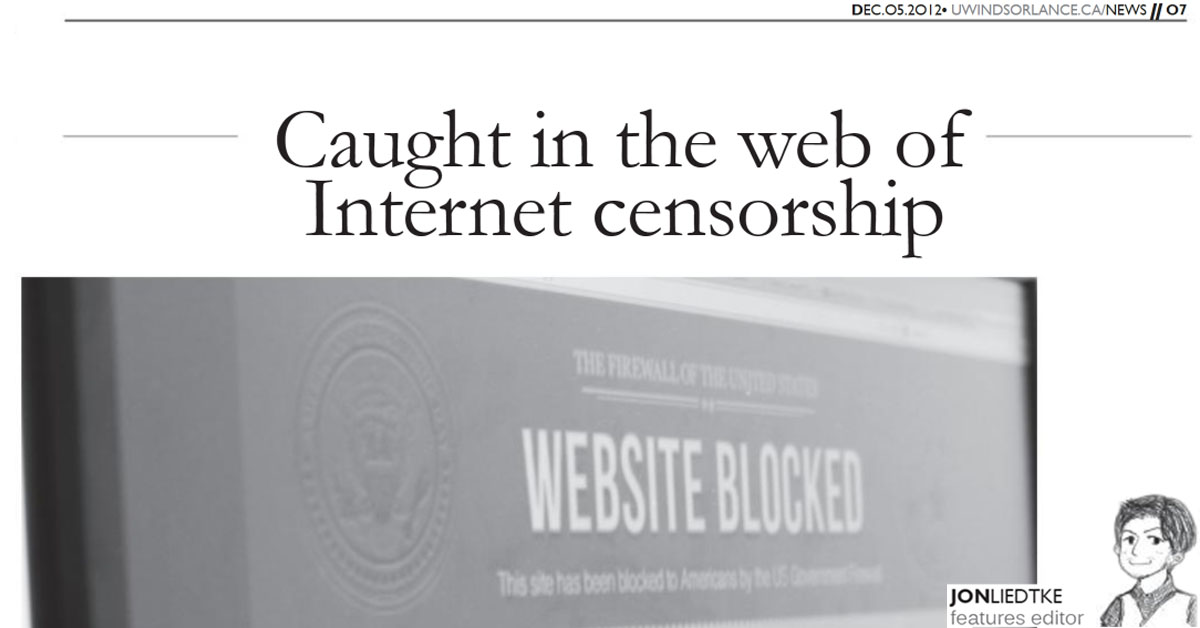UWindsor Lance
Issue 23, Volume 85
Dec 5, 2012
Jon Liedtke
The Internet is buzzing with open chatter over who, what and why any organization should act as the filter of billions of pieces of information tangled up in the World Wide Web.
The United States enforced new human rights rules last week opposing Internet censorship and announcing sanctions against five entities and four people, including Iran’s former communications and technology minister, Reza Taqipour, for Internet censorship and access limitations.
In Dubai, the World Conference on International Communications kicked off last Monday with the United Nation’s International Telecommunication Union poised to make decisions that may change how the Internet is used, controlled and policed. The U.S. government is strongly opposed to any changes to the treaty, arguing that the Internet cannot be looked at through the same lens as ‘traditional’ telecommunications and that changes could affect freedoms.
“The ITU proposals are really dangerous and have been hardened by a significant backlash against them, so that’s I suppose the good news about it; it’s clear a lot of people are very upset about it,” explained Michael Geist, a Canada Research Chair in Internet and e-commerce law at the University of Ottawa.
Closer to home, Bill C-30, known by its champions as the Protecting Children from Intenet Predators Act or by opponents as the Canadian spying bill, is still under the scrutiny of lawmakers. C-30 permits the government to allow authorities to collect personal information about Internet users’ online activities.
“We’re talking about warrantless access to the private information of any Canadian at anytime, which is totally unacceptable and creates a culture of paranoia and restriction around the Internet,” explained Openmedia.ca spokesperson Lindsay Pinto.
Openmedia.ca is a grass roots group that seeks to engage, educate and empower people to participate in Internet governance.
C-30 was included in the federal government’s 2012 omnibus budget, but, due to public pressure, the bill was removed to be debated upon separately.
“The government quite clearly got the message from Canadians that there were some serious problems [with the legislation],” said Geist.
“For over a decade now, one of the consistent themes has been ‘show us the evidence that the current system has created some significant problems for law enforcement, “‘ said Geist. “I have to say, for me, it’s been really disappointing that that kind of evidence has been few and far between.”
An amendment to the Canadian Copyright Act, Bill C-l l, upsets Geist as well. In his view, a negative part of the bill regards digital locks, programming used to protect digital media such as CDs and DVDs from being copied.
“All we’re calling for is a more flexible approach when it came to digital locks,” said Geist, referencing national copyright consultation and hearings conducted by the Canadian government when the legislation was introduced. “So the fact that the government was unwilling to shift on that, I think unquestionably due to heavy U.S. pressure, is disappointing, but perhaps in hindsight not all that surprising given that the US. made this its top priority.”
“There’s a lot to like about this bill (C-I I ),” said Geist. The bill has appeal for consumers with expansion of fair dealing, personal copies, backup copies, format shifting, time shifting (with recording of television programs), a provision on user generated content, a good balance on the role of Internet providers, and a cap on statutory damages for non-commercial infringement.
“These are all very significant changes from a consumer perspective,” he said.
The $5,000 cap on statutory damages is one of the first in the world, but many
other countries don’t have statutory’ damages whatsoever. “We can count our blessings that the government has had the sense to say that they ought to be distinguishing between commercial infringement and non-commercial infringement knowing that these kinds of statutory damages in commercial
cases never really envisioned the kinds of lawsuits that we have now against
individuals,”
Cap or not, the Trans Pacific Partnership, could, according to Pinto, “criminalize everyday uses of the Internet.”
The TPP is a multinational trade agreement that includes an intellectual property rights chapter with restrictive provisions.
“It’s really just an expansion of corporate power and expansion of [the] power of big media to push back against independent voices online [and] innovative uses of the Internet,” explained Pinto.
Geist is concerned with the TPP and other trade agreements such as CETA because driving the discussion surrounding intellectual property rights is “the use of trade and trade discussions and negotiations, which in almost every situation occurs behind closed doors, often in secret locations, without public access to what is even being discussed. “
Canada has recently concluded more than 10 years of often contentious debate on copyright reform and Geist explained, “It’s hard to say that there wasn’t at least consultation, discussion and debate about it. “The extent to which something like the TPP might be used to circumvent or get around the very compromise the government just finished championing is really troubling. “
Pinto would like to see the user in control of the Intemet, rather than governments or organizations.
“We’re asking for a multi-stakeholder approach,” said Pinto. “We want citizens involved [and] we want to make sure that decisions are open to citizen participation and civil society organizations, a wide range of Institutions.”
“I’m not sure that we need any sort of global monitoring of the Internet,” suggested Geist. “Laws apply online just as they do offline, one of the dangers that we have are efforts to come up with all of these new Internet regulations and I’m not convinced that they’re strictly necessary.”
Caught in the web of Internet censorship
Issue 23, Volume 85
Dec 5, 2012
Jon Liedtke
Page 7
Jon Liedtke was the Features and Opinions Editor, Advertising Manager and Deficit Consultant at the UWindsor Lance.




Leave a Reply